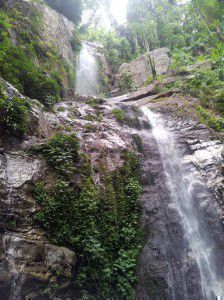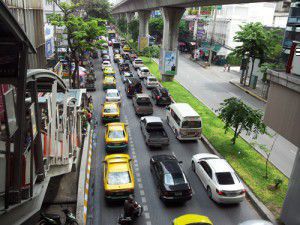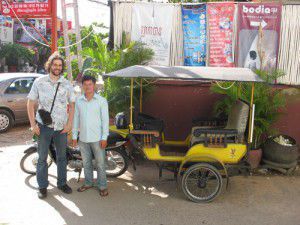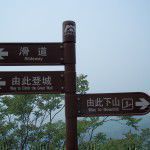10 reasons to visit… Thailand
Jakub was a junior developer at EuroTalk until recently, and last month he spent a few weeks in Thailand, so we asked him for his tips on what to see and experience in this amazing country. Here are Jakub’s ten reasons to visit Thailand… and if you’ve got anything to add, please write us a comment at the bottom of this post, or tweet us @EuroTalk.
1. Food
Thai food is my personal favourite out of Asian cuisine. A food lover (especially carnivorous) will find himself in a gastronomical paradise once he sets his foot on this land. There are BBQ’d meat stalls every 50-100 metres which offer chicken, pork or liver on a skewer for 10 bahts. The equivalent of 18p. How cool is that. Apart from this you can come across stalls offering rottee (Asian version of pancakes), different kinds of sausages, soups, curries and the all-time classic – pad thai. And if you’re brave enough you can have some deep fried crickets, cockroaches, scorpions and snakes. All made from juicy meat, intense spices and fresh vegetables for less than a quarter of the average UK price.
2. Stunning views
Once you got your plate full of Thai deliciousness you would like to sit down and relax. No worries, dear traveller! You can enjoy gorgeous mountain views in the north (i.e. Doi Suthep near Chiang Mai) or chill out by the beach side in the south (i.e. Ao Nang) or even two combined on one of many islands (such as Koh Tao). Even the cities themselves can offer unique street panoramas (Chiang Mai’s old city).
3. Scuba diving
Thailand is one of the best places on Earth to admire the underwater world. Loved the ocean exploration programmes on travel channels? Well, now you can see everything with your own eyes and within reach of your hand, floating around just like an astronaut in outer space. And it feels like a different world.
4. Moon Parties
Koh Phangan, an island in the south of Thailand, is the host of one of the biggest parties in the country. The biggest one is the Full Moon Party, where you can dance to club music on a beach until sunrise, drinking the famous buckets, and get your body painted with UV reflective paint. Want to go to the jungle? Sure thing! Just keep your eyes peeled and look for the next Half Moon Party, where you can also enjoy dance music topped with fire shows and chilling out on hammocks. There are also less crowded, but still popular Red Moon Parties, Blue Moon Parties, Boat Parties. This island never goes to sleep.
5. Riding a scooter
Scooters and motorcycles play a big part in Asian everyday life – having a scooter is as essential as having a fridge or a washing machine. On top of that you can watch things unseen in Europe, like driving without helmet and shirt, 4-5 people on one scooter, ladies sitting sideways or even dogs balancing in the back! Scooter rental is very popular and, in my opinion, the first thing you should do when coming to a new town. Renting a scooter for a day costs as much as two taxi rides. Beware though – if you haven’t ridden a motorcycle previously, especially in dense traffic, Thailand is not a good place to learn how to drive, even if some rental places will let you without previous experience.
6. Climbing
Krabi is known for its gigantic limestone walls and for that reason it is the Thai capital of rock climbing. Even if you haven’t done this before, don’t worry – there’s a dozen climbing centres offering taster and training sessions. And if you want to spice up your climbs, why not try deep water soloing? If you fall off a wall, you take a dip in the sea and start all over again!
7. Long tail boat ride
Thais know what real recycling is. Apart from the bright, eye-catching colours of their boats there’s one element that stands out – a massive engine taken out from a car and installed on a hinge with a propeller attached to it. You can ask just for a cruise to see magnificent rocks sticking out of the sea or visit a tiny remote island and feel like Robinson Crusoe.
8. Tuk tuk rides
Although tuk tuk drivers will charge you twice or three times as much as a regular taxi, it’s worth the money as a one-off experience. Tuk tuks differ between towns, and the most colourful and distinctive are in Bangkok – motorcycle front with integrated rickshaw-like back is quite comfortable (provided you’re not a 6″3′ bloke) and, if you’re lucky and tip the driver, you might see some wicked tricks on the road (not for the faint-hearted).
9. Thai massage
Yes, I know it sounds cliché, but come on, it’s like being in England and not drinking English tea. One hour-long session and you’ll discover muscles in your body you’ve never used, leaving you crawling out of the place pleasantly relaxed. One thing to bear in mind is to go to such a place during the day with workers wearing uniforms, not by night to a dodgy place with ladies in dresses and high heels.
10. Everything’s cheap
All the things mentioned above have one huge advantage: they’re incredibly cheap. Piles of food for less than 3 pounds, hiring a scooter for as much as a single underground fare, night in a single room for 4 pounds, beer in a bar for a quid and the list goes on. The only real cost is the plane ticket and the rest – you could easily have a month’s trip with a 500 pounds budget. And it’s totally worth it.
Jakub
Thinking of following in Jakub’s footsteps? He found that away from the main tourist areas, knowing a little bit of Thai was really useful. So before you jump on a plane, remember to download uTalk or check out one of our other Thai programs.
15 cultural faux pas to avoid when travelling
Before you go on holiday, or on a business trip abroad, it’s a great idea to learn a little of the local language. But getting along with people is about much more than just the words you say. There are other rules too, so here are our top tips to avoid misunderstandings abroad.
1. Be very careful when exchanging business cards in Japan: they aren’t just cards, but representations of the giver and should be handled with some ceremony. NEVER write on a business card or put it in your back pocket, as this is considered disrespectful.
2. Don’t talk about work over dinner in New Zealand, even if you’re having a meal with your colleagues. It’s fine to talk business over lunch, though.
3. In Muslim countries it’s considered an insult if you show the soles of your feet, so watch how you sit.
4. If you’re in Hungary and you’ve been told your meeting is at ‘fél négy’ (‘half four’), don’t turn up at 4:30 – ‘fél négy’ actually means half an hour TO four, so you’ll need to be there at half past three.
5. On the other hand, if you’ve been invited to a gathering in France, always aim to arrive 15-30 minutes late, to allow the host time to get ready.
6. Making a circle with your forefinger and thumb as another way of saying ‘OK’ is seen as an extremely offensive gesture in Brazil. As is the ‘thumbs up’ gesture in Iran, and showing your palm in Greece. It might be better to just avoid hand gestures altogether…
7. In Germany, not making eye contact when you clink glasses is considered very rude. It also, apparently, means you’ll have seven years’ bad luck in the bedroom. So even if you’re not worried about being thought bad-mannered, it might be worth making the effort. Just in case.
8. In Bulgaria, nodding your head means no, and shaking your head means yes, which is the opposite of what most of us are used to. This is worth remembering or you could get yourself into all kinds of trouble.
9. It’s been illegal to bring chewing gum into Singapore since 2004, because of the damage being caused to public buildings and facilities by people leaving their gum behind. You can also be fined for not flushing a public toilet.
10. In Russia, if you’re giving someone flowers, make sure you give them an odd number. Even numbers are for funerals.
11. It’s important to show respect to your elders in Asia, so don’t call them by their name; instead use ‘Auntie’ or ‘Uncle’, even if you don’t know them.
12. When eating a meal in Spain, you’ll be expected to clear your plate, and leaving some food is seen as rude. In Russia, on the other hand, you’re expected to leave a little as a sign that your host has provided enough to fill you up. And in China, a polite belch when you finish eating is considered a compliment to the chef, although it’s frowned upon in many other countries.
13. Never say anything disrespectful about the king in Thailand, as this could land you in prison for several years.
14. Make sure you’re appropriately dressed before going to church in Italy. This means your shoulders, knees and midriff should all be covered, or you won’t be allowed in.
15. In Malawi, it’s common for people of the same sex to hold hands; this is a sign of close friendship, so don’t worry if someone tries to take your hand. It’s a compliment. Men and women holding hands is rare, though, and may be frowned upon.
As always, if anyone has any others, we’d love to hear from you!
A Lonely Planet?
Ask your grandparents where they went on their honeymoon and the vast majority will answer that they went to some seaside town within their own country. My grandparents for instance went to Scunthorpe, and by all accounts had a brilliant time. Now look at the destinations of the people who have recently been married around you, or those just heading away for a trendy city break or backpacking around the globe. Just in our office alone I am sure we can cover most of a world map with little flags signifying the countries we have visited. My point? The world appears to be shrinking and with it comes a certain amount of damage to areas of unprecedented beauty and to some of the many wonders of the world.
 In certain cases an increase in popularity or accessibility can lead to a few oddities, and fun, if unsympathetic activities. For example, in China at the UNESCO protected site of Mutianyu, what better way to place yourself in the shoes, or sandals, of the Mongol hordes than tobogganing down the side of the Great Wall of China? The same occurs at the site of the bridge over the river Kwai. The museum explains the history of the Burmese railroad, the numbers who died in its construction and the events portrayed in the 1957 film. You can then ride across the bridge on a traditional garishly rainbow coloured, road worthy train. Small gripes I know but are we not losing the significance of these sites by diluting them with fairground distractions? Or do these attractions simply add to the entertainment value of an area?
In certain cases an increase in popularity or accessibility can lead to a few oddities, and fun, if unsympathetic activities. For example, in China at the UNESCO protected site of Mutianyu, what better way to place yourself in the shoes, or sandals, of the Mongol hordes than tobogganing down the side of the Great Wall of China? The same occurs at the site of the bridge over the river Kwai. The museum explains the history of the Burmese railroad, the numbers who died in its construction and the events portrayed in the 1957 film. You can then ride across the bridge on a traditional garishly rainbow coloured, road worthy train. Small gripes I know but are we not losing the significance of these sites by diluting them with fairground distractions? Or do these attractions simply add to the entertainment value of an area?
In Thailand I also visited Koh Phi Phi, a small island chosen as the location of The Beach, a Leonardo Dicaprio film and book by Alex Garland, which portrayed a utopian island experience far away from the western confines of the mass backpacker route. 
Ironically the setting for this isolated paradise is now one of the most visited areas in Thailand and ’the Beach’ is now thronged with noisy tourists; the Andaman waters are now gleaming because of the residue left from the flotilla of tourist-packed speed boats that arrive at the location twice a day. Despite the numbers of tourists, ‘the Beach’ topped almost all guide books as a must-see, and whether I had been there was the first question fielded from friends at home. In the end it was simply a ticked box rather than a once in a lifetime experience.
What I am trying to determine from these small examples are the opinions of other tourists and travellers. I wanted to go somewhere because it was famous. People have heard of ‘the Beach’ and everyone knows about the Great Wall of China. But should the accessibility to these locations be limited? Is accessibility a good thing?
The example I want to finish on is Tibet. An area known by most people as a far outpost of China, an area little visited due to its isolation from, well, everywhere! It’s a spiritual area isolated from the western world, it takes two days by train to get there. With China planning a high-speed rail link to the area, how long will it be before you can toboggan from the top of Lhasa’s famous monastery?
Glyn










